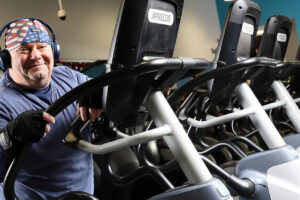Breathe in. Breathe out. We don’t think too much about the breathing process, but your breath can tell you a lot about your body.
A simple breathing test called a metabolic rate analysis can provide a wealth of information about how efficiently your body converts what you eat into the energy necessary to function. The breathing test takes about 10 minutes, and you can’t eat, exercise, or drink caffeine for at least four hours before the test. During the analysis, a clip will be placed on your nose to prevent you from breathing through it. You’ll then be instructed to breathe through a mouthpiece that’s connected to a machine that analyzes oxygen usage.
Analysis Provides Meaningful Metabolic Metrics
Taking your age, height, weight and gender into consideration, the machine analyzes your breath and determines:
- How many calories you need to maintain your weight
- The ideal range of calories you should eat to lose weight
- How your metabolic rate compares to others with similar characteristics
- How much energy you expend while resting
- How many calories you burn doing daily activities
- How many calories you burn during 30 minutes of moderate exercise
During the 30-minute appointment, a trained professional will explain your results and provide a printout of the data. If desired, you can make an appointment for an hour-long nutrition consultation with a registered dietitian. The dietitian will review what you eat, and explain how your diet is impacted by your lifestyle and the changes needed to maintain or lose weight.
Most people who participate in a metabolic rate analysis do so because they would like to lose weight. Some, however, participate because they have been working out and aren’t seeing the results that they’d anticipated. Or they are serious athletes who are training for a specific event, like a marathon, and need more information about how their bodies use the calories that they’re eating.
For others, the test can provide clinical proof that the changes that they have made are having an effect. A client in her 50s joined The Star and Barry Tobias Health Awareness Center’s weight loss program in February 2017. She had her metabolic rate analyzed in May and then participated in two more weight-loss programs at the Center. She had another analysis done in October and learned that her metabolic rate had indeed improved. She has lost 15 pounds and continues to exercise at CentraState’s Fitness & Wellness Center and fine-tune her diet to lose weight safely.
Three Facts About Your Metabolism
Contrary to common belief – and the internet – several widely accepted myths about boosting your metabolism are simply hot air. Here are the facts:
- Eating late at night does not slow down your metabolism. What late-night snacking can do, however, is lead to mindless overeating, which can add unnecessary calories.
- Chili peppers and green tea won’t provide a lasting boost to your metabolism. While these foods may provide a temporary boost, it’s not enough to counteract eating too many calories.
- A drastic low-calorie diet isn’t the key to weight loss. Research has shown that the body goes into survival mode when calorie intake drops suddenly. Your metabolism will slow down to conserve calories, having the opposite effect of what was intended.
Pump Iron to Boost the Burn
Genetics play a major role in how quickly our metabolism converts calories into energy. However, building lean muscle mass through activities like strength training will speed up your metabolic rate. As we age, we typically store more body fat and less muscle mass, but it’s possible for anybody at any age to counteract that trend through consistent, muscle-building activities.
Metabolic rate testing is available at The Star and Barry Tobias Health Awareness Center at CentraState Medical Center as part of the hospital’s Live Life Well program. The service is open to anyone in the community.
For more information on metabolic rate analysis, call 732-308-0570.
 Caryn Alter, MS, RD, FAND, is a registered dietitian at The Star and Barry Tobias Health Awareness Center at CentraState Medical Center. She holds a master’s degree in nutrition and public health, and is a fellow of the Academy of Nutrition and Dietetics.
Caryn Alter, MS, RD, FAND, is a registered dietitian at The Star and Barry Tobias Health Awareness Center at CentraState Medical Center. She holds a master’s degree in nutrition and public health, and is a fellow of the Academy of Nutrition and Dietetics.





